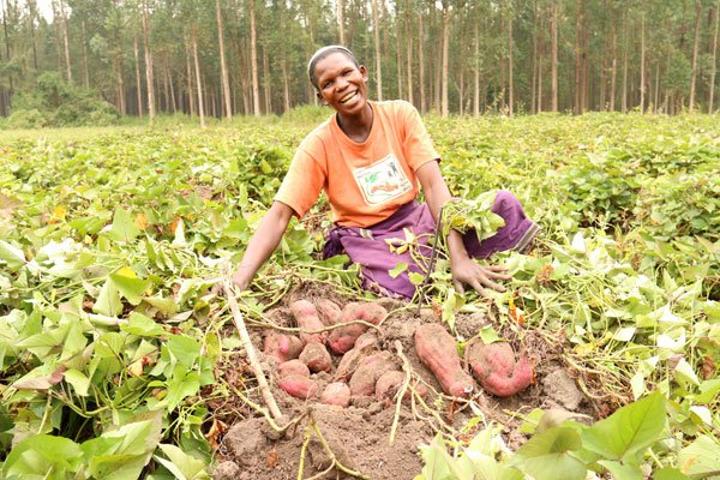Africa-Press – Ethiopia. Desperate times call for desperate measures. With the wheat prices skyrocketing out of the roof globally largely due to the ongoing Ukraine-Russia war, manufactures have been forced into undertaking alternative innovations to stay in business.
According to the World Food Programme, 40 percent of the world’s wheat supplies come from Ukraine, and the continuing conflict in the European nation has coincided with the increment in bread and raw materials price in Uganda.
In a three-company partnership, Jonisa Bakery, a privately owned company with major interest in entrepreneurial participation in the food sector value chain, HarvestPlus, a Ugandan NGO working to help alleviate vitamin A deficiency and Lishe company have birthed a novelty – the tasty, healthy orange potato bread. According Jude Asiimwe, the product development manager at HarvestPlus, the new potato loaf hitting the market not only reduces the usage of expensive wheat in production but is also spiced with vitamin A.
“In producing this bread, we focused on micro nutrients that have been lacking amongst Ugandans. Vitamins are needed in small quantities but are very vital for the conditioning of our bodies. HarvestPlus promotes staple foods that are richer in vitamin A and minerals,” he says.
Value addition
HarvestPlus majorly focuses on getting zinc and iron minerals and works on a number of crops such as orange sweet potatoes, orange maize and iron rich maize, pearl millet in Karamoja and that leads them to supporting the farming communities.
Asiimwe adds that they realised that most Ugandan farmers have more sweet potatoes without a ready market so they decided to go for innovations to extend it into confectionery use. “We mash sweet potatoes to make flour that is mixed with wheat to make bread which is rich with adequate levels of vitamin A. Unlike the white bread, vitamin A is needed every day.
More foreign exchange
On a national level, Asiimwe reveals that they are looking at saving the foreign exchange earnings by cutting down on the amount of wheat the country imports and diverting the money to farmers.
“As of 2020, wheat importation in the country stood at about $400m. We target a reduction of at least 10 percent of that money haemorrhage. Jonisa is substituting only 25 percent and that means that annually Uganda can save about $40m which goes back to farmers,” he says.
More still, the orange sweet potato bread has a nutrition advantage of reducing sugar consumed as the baker reduces it by 10 percent. Put simply, the latest innovation will enable consumers to save money and improve their nutrition.
Simplistic value chain
The process starts with HarvestPlus identifying farmers that planted vines from the Naro research centre. They are harvested after four months and not peeled. This work is done by Lishe a value addition factory in Gayaza. Lishe fully washes the potatoes before steaming it for close to 30 minutes. It is then munched into potato puree and packed before being sent to the Jonisa bakery at Kiwalye-Ngalamye in Wakiso District. Munching the puree is recommended for seven minutes.
It is often kept in refrigerated conditions to avoid going stale before use but according to Asiimwe, they are working with a group of researchers from Makerere University to establish modern preservative technology. Currently, Lishe is supplied the potatoes by mainly a refugee farming group but as demand increases, they intend to tap into HarvestPlus’ close to 900,000 farmers countrywide database for supply.
The potato puree is yellow in curry and is weighed before being delivered to Jonisa Bakery for further production. Making potato bread requires soft puree and so there is no need to dry it or add any preservatives.
At Jonisa, they do the ratios, substitute 25 percent of the wheat – putting 50 kilogrammes of wheat and 20 kilogrammes of potatoes. At the moment Lishe delivers 300 kilogrammes of soft potato puree daily to Jonisa. According to Jimmy Ssegawa, the production manager at Jonisa, they use only 90 kilogrammes per day.
“We began with one bag but today, we require 10 bags of puree a month and that shows the progress of the innovation. We combine the puree with other ingredients such as wheat and salt to make bread and scones in ratio of 2:3. At least 40 percent of ingredient is the sweet potato puree,” he explains. Every day, they make more than 100 loaves of bread of the 250g and 400g, which they sell from Shs3,000 and Shs5,000. Jonisa which has more than 100 workers, has Unbs certification for the bread and puree.
More benefits
Interestingly, the potato bread invention is less than a month old but gradually gaining market attention for its myriad of merits.
Ssegawa maintains that the bread is cost cutting judging by the raw materials that are used and based on the low cost production cycle. “When you see the standard recipe for normal bread, it is cheaper. You lower some of the ingredients that are used and save production costs. Secondly, in the production cycle time is shorter because it does not require much fermentation yeast material while baking. It is cost saving and uses less power and takes less time to be baked,” he says. “It gives us more bread than wheat bread. Imagine an extra 16 loaves compared to normal one, it is profit giving, it is a healthy bread,” says Ssegawa.
A loaf of potato bread goes for Shs5000 in supermarkets and like the wheat bread, it has a shelf life of six days.
Future plans
The producers are looking at higher production to satisfy the home demand and also venture into the foreign market that craves Ugandan orange sweet potatoes. Apart from potatoes helping greatly to reduce the national vitamin deficiency from about 25 percent in 2006 to nine percent at the moment, the need to change the unpopular perception that potatoes are a preserve for the poor is glaring.
Frank Tumwebaze, the Sales manager at Jonisa Bakery says they are yet to attain patent rights for their baby product but they are sure experts behind the making the product make it different and sweeter than anyone who may try to replicate it.
Milestone
John Kitembo a sweet potato farmer, says while he supplies the produce to the factory, he sells to other farmers as well. A 30 kilogramme bag of sweet potato vines goes for Shs50,000. This season, Kitembo sold 76 bags for Shs3.8m from his half acre. Initially, the farmer would get as low as Shs500,000 total income.
For More News And Analysis About Ethiopia Follow Africa-Press






